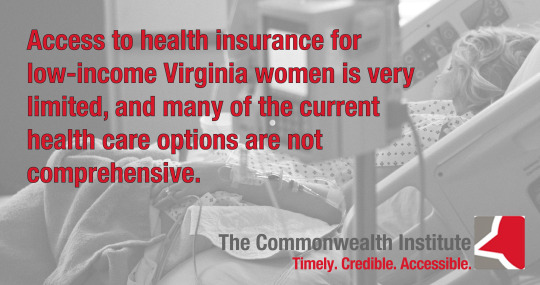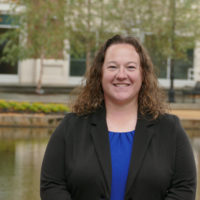March 21, 2018
Fixing Healthcare Access for Virginia Women
When lawmakers return to Richmond on April 11, they’ll have the opportunity to improve the lives of more than 118,000 women in the commonwealth who are uninsured and could gain coverage if Virginia expands its Medicaid program. Doing so would turn Virginia’s current swiss cheese system of limited health benefits and arbitrary income cut-offs for low-income working women into access to comprehensive, affordable health care through the state’s managed care Medicaid program.
Currently, access to health insurance for low-income Virginia women is very limited, particularly for women who are not pregnant or raising children. And many of the current health care options are not comprehensive health insurance.
For low-income women with serious mental illness or substance use disorders, the Governor’s Access Program provides limited outpatient medical and behavioral health care coverage, but not inpatient hospital treatment in case of cancer or other non-behavioral health diagnosis. A single woman can make no more than 100 percent of the federal poverty level ($12,663 a year in 2018) before she can no longer get these services.

Virginia’s Plan First program, another limited Medicaid program, covers physical exams only for family planning purposes, family planning education and counseling, testing for sexually transmitted infections, as well as various methods of contraception. And a single woman can make no more than about twice the federal poverty level ($24,887 a year in 2018) before no longer being able to access these free services. But the program does not cover treatment for medical problems.
If a woman does become pregnant, she may receive comprehensive health care through Virginia’s Medicaid program if she earns no more than $24,048. But that’s only during the pregnancy itself and for just two months afterwards. When that two months is over, in most Virginia localities a mother with a child is no longer eligible for Medicaid if she makes more than $5,292 a year under current rules.
Of course, women have health needs far beyond reproductive health. In 2014, Virginia was ranked 14 out of 50 states and the District of Columbia for high rates of new cases of invasive female breast cancer. And five-year data (2010-2014) suggests that these rates are likely to rise. Breast cancer is the most frequently diagnosed cancer in women and, if caught early, women have high chances of beating it. But access to affordable preventative services is critical.
A 2016 report by the Virginia Department of Health states that both income and insurance status were associated with whether or not Virginia women had a mammogram screening. Nearly 81 percent of insured women reported having a mammogram screening while only 55 percent of uninsured women took this important step within the two years prior to the survey. Women with low incomes were also less likely to have the screening.
Older women also benefit from access to Medicaid. Women are more likely to live longer than men and, as a result, are more likely to require long-term care – services which are not covered by Medicare. Medicaid covers these costs for low-income older women, provides assistance paying Medicare premiums, and also provides access to vision and home-based health care, if needed.
By expanding Medicaid, women without children who make very low incomes – less than $16,643 per year – would have access to comprehensive, quality health care, rather than the current piecemeal system of partial insurance based on pregnancy and health status. And a mother would continue to be eligible even after she gives birth, which also makes it more likely that her children will receive care. In accessing health care herself, a woman would be better able to keep her job, care for her children, and worry less about the detrimental impact that medical debt could have on her financial security at any age.
Expanding Medicaid would not only save the state millions of dollars, it could save an invaluable number of women’s lives.
Category:
Health Care
